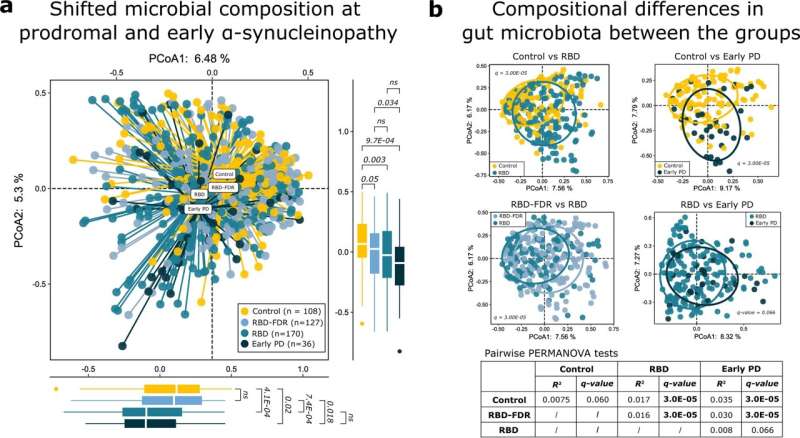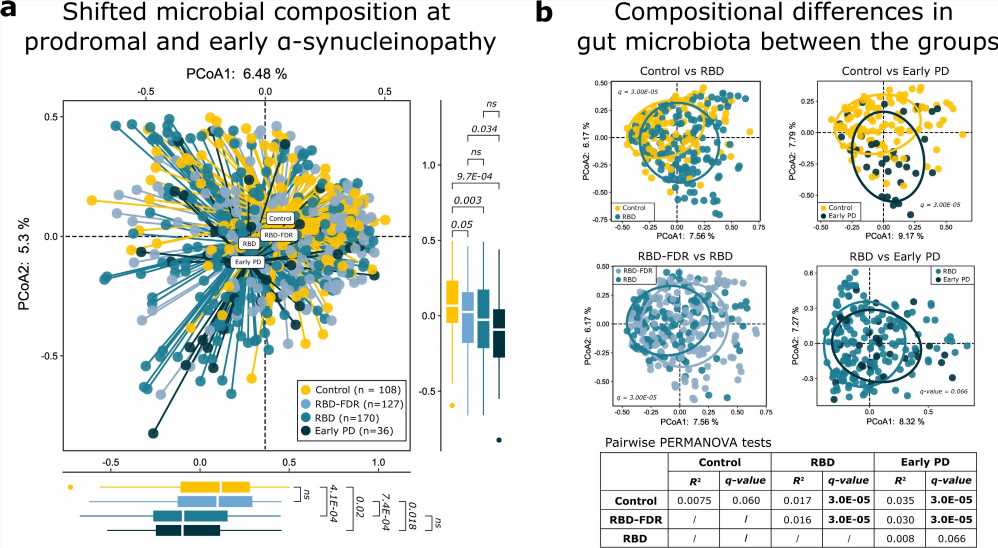
Scientists at The Chinese University of Hong Kong have found that the gut microbiome holds Parkinson’s disease markers and may indicate a method of early diagnosis.
In the study, “Gut microbiome dysbiosis across early Parkinson’s disease, REM sleep behavior disorder and their first-degree relatives” published in Nature Communications, the research team looked for correlations in the gut microbiota between comorbid pathologies to see if they could find a causal link.
REM sleep behavior disorder (RBD) causes people to physically act out their dreams while sleeping. RBD affects around 40% of patients with Parkinson’s disease (PD), which is also a condition of unintended movements. Patients with RBD are even more likely to acquire PD at some point. The partial overlap in conditions raises interesting questions, and researchers looked to the gut for answers.
In recent years growing knowledge around the gut-brain connection and the relationship between neurological pathologies and microbiota populations has inspired researchers to focus more attention on the role the gut plays in overall human health. While causal relationships are not always clear, correlations between pathologies and microbiota profiles can be strikingly similar across patients with shared diagnoses.
Parkinson’s is characterized by the abnormal aggregation of a presynaptic neuronal protein in the central nervous system (spine and brain), alpha-synuclein (α-syn). While this had been considered causal to the pathology, the authors cite studies offering increasing evidence that α-syn pathology has already occurred in the enteric nervous system (neurons embedded into the walls of the gastrointestinal system).
Following the related symptom progression backward, RBD is considered the most specific precursor signal of Parkinson’s. Patients with RBD report having an increased prevalence of constipation and increased phosphorylated α-syn immunostaining in their enteric nervous system. Parkinson’s patients with RBD features also exhibit these increased constipation and enteric α-syn histopathology effects compared to those without RBD, suggesting a distinct subtype of Parkinson’s disease that reflects a gut-brain link of α-synucleinopathy.
Isolated RBD symptoms not yet meeting the diagnostic criteria for RBD might reflect a precursor stage of RBD. A recent study reported that the first-degree relatives of RBD patients had increased constipation, and a spectrum of RBD features from isolated RBD symptoms diagnosed RBD. The clustering suggests to researchers that RBD relatives might be a group of susceptible individuals at a much earlier stage of α-synucleinopathy of RBD and ultimately at risk of Parkinson’s.
The researchers performed a cross-sectional microbiome study across prediagnoses and early stages of the diseases along with controls and RBD relative to disentangle the associations of gut microbiota with the progression of α-synucleinopathy.
The study found gut microbiota compositions significantly altered in early PD and RBD compared with controls and the relative cohort. In RBD patients, the overall microbiota composition shifted closer to those with early Parkinson’s.
Random forest modeling identified 12 microbial markers, including depletion of butyrate-producing bacteria and an overabundance of Collinsella, Desulfovibrio, and Oscillospiraceae UCG-005. The profile produced a signal distinct enough to distinguish RBD from controls reliably with machine learning assistance. These findings suggest that Parkinson’s-like microbiota profile changes occur at the early stages of RBD-related Parkinson’s when RBD first develops.
Another interesting find was the depletion of butyrate-producing bacteria and enrichment of pro-inflammatory Collinsella in RBD relatives, a group that had not yet shared any of the other tell-tale signatures in the microbiota, hinting at a pre-precursor signal that needs further investigation.
The study finds markers for pathology pre-symptom progression of Parkinson’s disease and REM sleep behavior disorder, highlighting the potential role of gut microbiota in the pathogenesis of α-synucleinopathy. The observations open the door for future research to go beyond the correlations and seek the early causative path of both diseases in hopes of discovering what could be a pre-clinical diagnostic intervention to prevent Parkinson’s from developing in the first place.
More information:
Bei Huang et al, Gut microbiome dysbiosis across early Parkinson’s disease, REM sleep behavior disorder and their first-degree relatives, Nature Communications (2023). DOI: 10.1038/s41467-023-38248-4
Journal information:
Nature Communications
Source: Read Full Article
